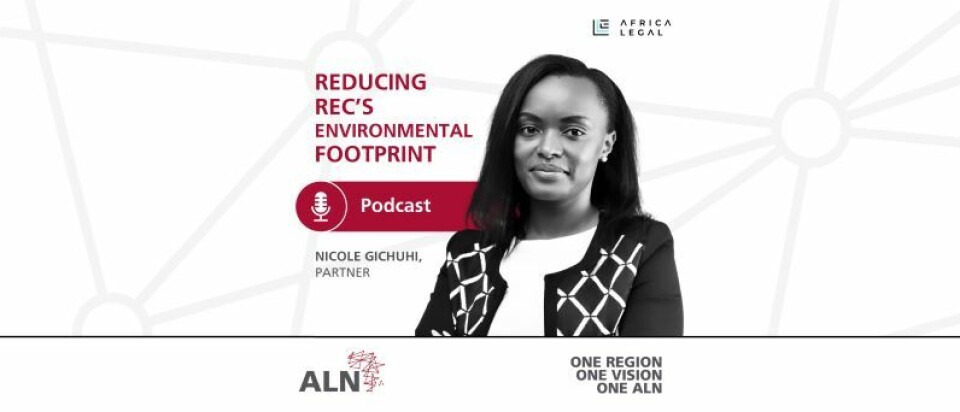Copyright : Re-publication of this article is authorised only in the following circumstances; the writer and Africa Legal are both recognised as the author and the website address www.africa-legal.com and original article link are back linked. Re-publication without both must be preauthorised by contacting editor@africa-legal.com
Reducing REC’s environmental footprint

In this episode of the Breaking Ground, Breaking Barriers podcast series focusing on East Africa’s real estate and construction landscape, Nicole Gichuhi, a partner at ALN Kenya | Anjarwalla & Khanna chats to Africa Legal about Africa’s development in the sustainability era.
The real estate and construction sector is one of the biggest contributors to greenhouse gas emissions, but sustainability practices such as using energy efficient building designs and materials, are actively reducing the industry's environmental footprint in Africa, and are helping to mitigate climate change and preserve ecosystems.
Nicole Gichuhi, who represents leading players in high value real estate transactions at ALN Kenya | Anjarwalla & Khanna, has noted a heightened awareness on the responsible use of land. This conscientious approach, she says, is not just driven by governments and legislation, but also by the industry, which is taking collective responsibility to protect the environment.
In the residential market, Gichuhi highlights that sustainable buildings often have higher market values, driven by the increasing demand for houses with natural lighting and efficient insulation, because it ultimately lowers their energy consumption.
“Sustainable buildings could lead to cost savings in the long run. Energy efficient buildings consume less energy, have lower utility bills, maintenance and operations costs. Over time, you'd be able to see that the cost savings can actually outweigh the initial investment.”
Gichuhi shares that sustainable real estate developments can also benefit from using locally sourced and sustainable building materials, thus making it more affordable.
She further explains how African governments are adopting environmentally friendly practices, and offers her views on what approach should be taken going forward, including that she believes incentives and tax benefits should be on the cards.
Gichuhi says their firm plays a legal advocacy role when it comes to its relations with the Kenyan government, including providing detailed comments during the public participation phase of legislative decision making processes. In addition, the firm also forges partnerships with other stakeholders such as the Green Building Society.
She believes there's a lot that can be learned from Kenya’s eco-friendly legislation when it comes to sustainable buildings, emphasising the potential for cross-cultural inspiration, citing the Maasai people as an example of a tribal community with insights that could contribute to sustainable practices.
Click here to listen to the full podcast on Soundcloud, Spotify and Amazon Music.
Click here to access additional audio platforms.
To join Africa Legal's mailing list please click here
